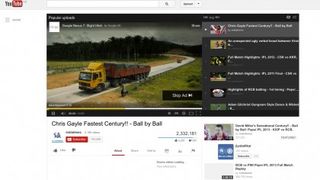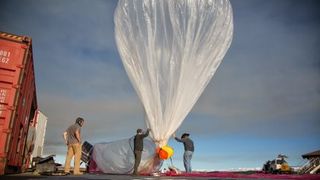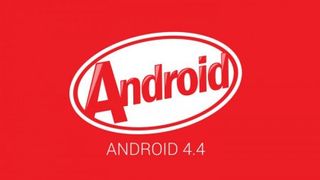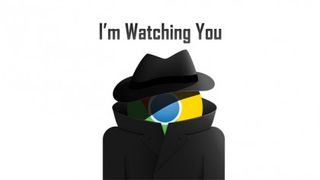Highs and lows for Google in 2013
Was 2013 a vintage year for Google?
YouTube starts to pay
With the share price up, Google's bean counters will be rubbing their hands with glee, but with YouTube really starting to pay this year, there will be end-of-year champagne corks popping all around Mountain View.
The reason is YouTube. The video streaming site's ads revenue jumped 50% this year to over $5bn, and it seems that VoD and advertising has finally come of age. However, that means that you're likely to see even more pre-rolls in 2014.

Chromebooks get Microsoft running scared
While Android went from strength to strength in 2013, Google's Chromebook has enjoyed a less rapid rise, but 2013 has seen a steady growth for the fledgling OS.
The beginning of the year saw a raft of new devices including the super-high end Chromebook Pixel, and despite the removal of the HP Chromebook 11 in November because of overheating problems, the Samsung Chromebook has been at the top of Amazon's best-seller's chart for most of the year.
What's more, it's got Microsoft running scared. With a backdrop of poor PC sales, Redmond has made Chromebook the target of its 'Scroogled' anti-Google smear campaign – a sure sign that whatever you're doing is working.
Get daily insight, inspiration and deals in your inbox
Get the hottest deals available in your inbox plus news, reviews, opinion, analysis and more from the TechRadar team.
And they're still innovating...
If you thought 2013 was just about Google throwing it's fiscal weight around, you'd be wrong. There was enough crazy new tech and ideas to remind us exactly why we love Google, and Glass was just the beginning.
While Glass is still far from a commercially ready product, Google started looking at even madder schemes such as the aptly named Project Loon.
The idea? Big G puts internet-giving balloons into the stratospheres of developing nations, to create a new connected infrastructure. At 60,000 feet Google says they can match today's current 3G network, and before you ask, no they don't need cables to attach themselves to the ground.

The lows
Google + comments on YouTube backlash
Google hasn't been afraid of causing controversy amongst its own users in 2013, and the changes to YouTube's comments have threatened to cause the biggest rift.
In November 2013, Google made it mandatory to sign in with Google+ to leave comments on YouTube. Be it a desire to clean up its service's notorious comment threads, boost metrics on its laggard social network or just make your data that little more saleable, user backlash was swift and unequivocal.
Even YouTube founder Jawed Karim – who earned $69m from selling out to Google – took to the site to complain.
What's the point of the Moto X?
If one of Google's success stories was its excellent Nexus 5, then one has to ask, what's the point of Motorola?
Google's new hardware arm has managed two phones this year, the flagship Moto X which hasn't yet left US shores, and the budget Moto G. Both received plaudits in our reviews, but they're distinctly average handsets, and they're being shown up by other Google-backed devices.
That cheap Nestle tie-in
Google's partnership with Nestle for the naming of Android 4.4 KitKat took everyone by surprise, and while both companies have repeatedly argued that no money has been exchanged, it's not a highlight in Google's year.
Google's adoption of the KitKat moniker may have been "fun and unexpected" as John Lagerling told the BBC but not high on the corporate responsibility list.

Speaking of corporate responsibility...
As said, corporate responsibility hasn't been high on Google's agenda in 2013, and headlines about the amount of UK tax it pays have refused to die down.
Out of the £506m raked in by Google's UK division in 2012, the company managed to get away with paying just £11.6m in tax, with some clever loopholes that cost the UK government an estimated £150m.
Privacy fail + PRISM fail
It's not just advertisers that Google's been giving your data to this year, and the NSA's PRISM scandal, outed by the Snowden leaks back in May 2013.
The information leaked to The Guardian and the New York Times showed that the big tech companies, including Apple, Facebook, Microsoft and Google, had a system that allowed the NSA access to private and encrypted information.
The revelations were bad news for Google, which had already been the target of privacy campaigners over Wi-Fi information it captured while recording Google Streetview in Germany, and it was ordered to pay $22.5m by US courts after circumventing Do Not Track controls in Safari.

"Oh my god, they killed Google Reader"
While Google made some people mad in 2013, it made many sad when it culled Google Reader back in July 2013.
The RSS feed reader had been a customer favourite, and was one of the few free tools for helping people sift through their favourite news services.
The company said that ""while the product has a loyal following, over the years usage has declined" which was a bitter pill to swallow for dedicated users, and over 150,000 were moved to sign a petition to keep it open.
Samsung is the only OEM that matters
The final blot on Google's yearbook is its failure to get more OEM's performing in the Android space.
In a year where even HTC has struggled with sales despite having an award winning phone and even Motorola isn't troubling the Android scorers.
This leaves Google with two problems: first, that it's not maximising the potential of Android, and secondly, that a powerful Samsung could drop Android for its own system.
Watch this space in 2014.
- Or you could skip straight to what Android will be like in 2020
